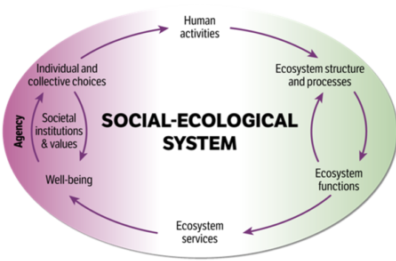By focusing on human activities that impact Arctic wetlands ecosystems, the Arctic Wetlands Ecosystems – Resilience through Restoration & Stewardship (AWERRS) project tackles the broad challenge of building resilience in a rapidly changing Arctic.
Led by SEI, this project involves partners and collaborators from Norway, Iceland, Sweden, the Russian Federation and the United States.
2020–2022
Icebergs, midwinter twilight and full moon in Ilulissat, Greenland. Ilulissat was declared a UNESCO World Heritage Site in 2004. Photo: Timothy Allen / Getty Images.
Arctic wetlands store an enormous amount of global carbon, offer crucial support for global biodiversity, and provide important ecosystem services for indigenous and other communities. They also constitute considerable parts of the Earth’s remaining wilderness areas. Yet, with rapidly warming temperatures and a dynamic human footprint, these ecosystems are changing fundamentally, bringing both Arctic peoples and ecosystems closer to potential tipping points.
Current knowledge of wetlands ecosystems is more than sufficient to support raising the priority level of Arctic wetlands restoration and stewardship. When we say stewardship, we mean to balancing conservation and use in order to ensure that the benefits we receive from wetlands are sustainable for the long haul at local, regional and global scales. Unfortunately, important gaps that impede stewardship remain.
Better knowledge is needed about which specific types and locations of wetlands should be prioritized for restoration and protection. This would help to prioritize areas where effort and financial investment could produce maximum benefit for climate, biodiversity and people.
A better understanding is also needed of how to guide the organization of conservation and restoration efforts in order to maximize the benefits from ecosystem services and strengthen wetlands ecosystem resilience. For example, participation by indigenous and local communities in decision making, restoration and stewardship of Arctic wetlands is widely considered to be a crucial ingredient for success. A growing number of wetlands experts are calling for indigenous and community participation in conservation and restoration efforts.
Policy aimed at protecting Arctic wetlands is expansive, yet evidence suggests three key challenges to policy being as effective as it could be. These include:
The greatest benefits of restoration and stewardship of Arctic wetlands often come in the form of broader public goods, in the form of less carbon emissions, habitat for key species and areas used intermittently for recreation and subsistence. As a result, wetland restoration and stewardship are often publicly financed or incentivized. All Arctic countries have financing mechanisms, yet much could be gained by mapping these, learning across borders, engaging the private sector engagement and ramping up efforts.
The project is funded through the Arctic II Initiative of the Belmont Forum: Resilience in Rapidly Changing Arctic Systems.
Partners, collaborators and funders are displayed in the drop-down menu on the left hand side of this page.
A central element of community resilience is the capacity to self-organize and effectively engage; a resource that needs to be used to remain viable. By strengthening social and human capital, and by supporting this engagement, community resilience will improve.
The goal of enhancing social and ecosystem resilience will be pursued by:
These goals and activities have been co-designed and developed within a transdisciplinary consortium of knowledge holders, policy experts and practitioners.
This project seeks to better understand how deliberate actions can serve to bolster the resilience of both the wetland ecosystem being acted upon, and of the communities engaging in those actions (B. Walker et al. 2002).
It will identify and analyze ways to pursue restoration and stewardship to contribute substantially to wetland resilience, climate mitigation, and other essential ecosystem services (including provision of food and water, biodiversity and culture).
Social-ecological system model:

Image source: Arctic Resilience Report 2016.
Marcus Carson is the Lead Investigator, Nelson Ekane is the Project Manager and Ylva Rylander is the Communications Officer of this project. Aaron Maltais is engaged through the Stockholm Sustainable Finance Centre.
For suggestions, requests, or contributions, please email to [email protected].
The project is funded through the Arctic II Initiative of the Belmont Forum: Resilience in Rapidly Changing Arctic Systems, with the following funders:
Journal article / Scenarios have a lot of potential to support sustainability in the Arctic. How can they be made more robust?
3 September 2019 / About Participation
Other publication / Wetlands provide critical ecosystem benefits. This study inventories Arctic wetlands and reviews current knowledge on these unique environments.
22 March 2019 / About Ecosystems and Land use
Feature / We know the Arctic is changing fast, but the big picture is rarely captured. The reality is that changes in the region are closely interconnected.
24 November 2016
Design and development by Soapbox.
